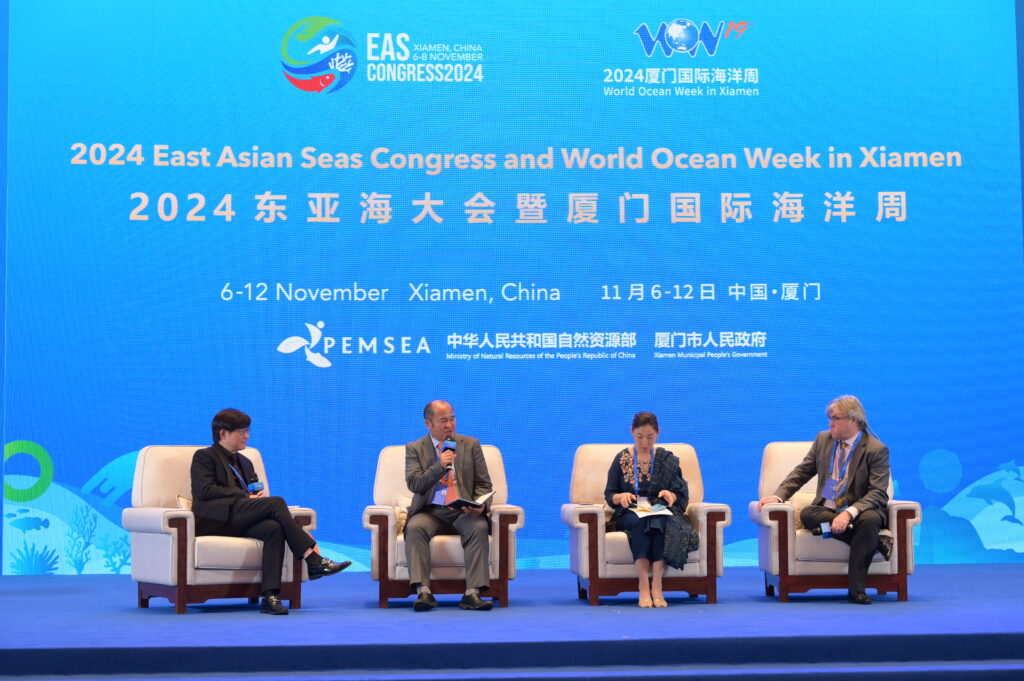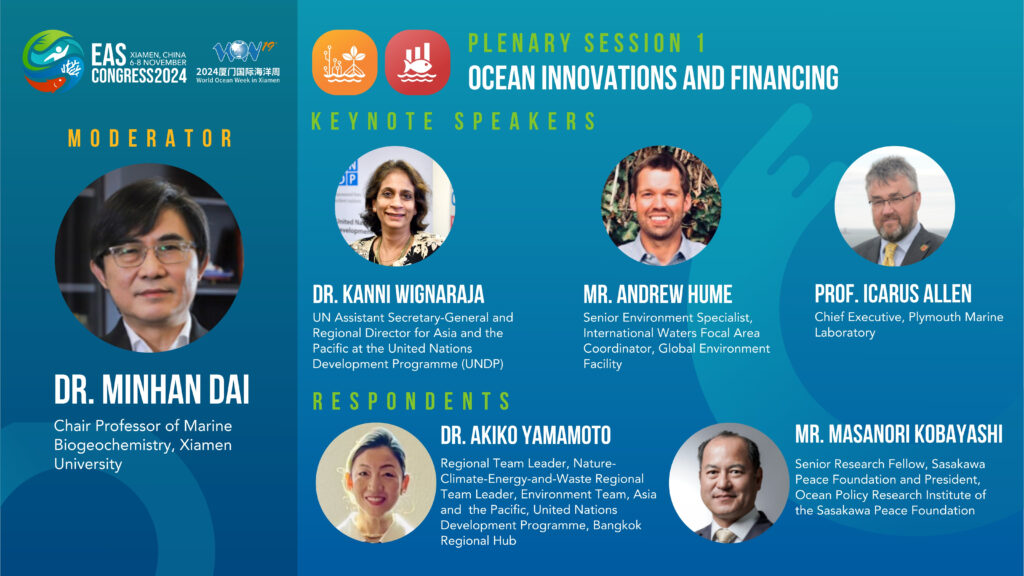Plenary Session 1: Ocean Innovation and Financing

“Our oceans generate 50% of the oxygen we breath and provide food, trade and economic opportunities, plus livelihoods for over 3 billion people. Managing and respecting our oceans instead of polluting and warming them could be the make-or-break moment to win the war against climate change,” said United Nations Development Programme (UNDP) UN Assistant Secretary- General and Regional Director for Asia and the Pacific Dr. Kanni Wignaraja at the EAS Congress 2024’s 1st Plenary Session.
The Introduction of the International Conference (IC) was delivered by Dr. Keita Furukawa, highlighting the IC as a marketplace of knowledge-exchange, sharing and learning about the progress of initiatives, solutions, lessons and forging collaborative actions amongst various stakeholders within the East Asian Seas region and beyond.
The EAS Congress’ first plenary session on Innovations and Ocean brought together thought leaders at the forefront of various technological and financial innovations to share their visions and experiences in driving positive transformation in ocean and coastal management. Dr. Kanni Wignaraja’s keynote address indicates that there is a current momentum to do better on ocean sustainability driven by the UN Decade of Ecosystem Restoration and the adoption of the BBNJ Agreement, wherein 196 countries committed to protect 30% of the world’s coastal and marine areas by 2030.
Mr. Andrew Hume mentioned that in the current replenishment of GEF 8, the International Waters Strategy continues to build on its long-term goal of fostering collaboration in shared marine and fresh water ecosystems to achieve global environmental benefits. Mr. Hume remarked that one example of successful transboundary cooperation in international waters is PEMSEA, through the East Asian Seas partnership which has been active for 30 years.
To provide examples of cutting-edge technologies to protect our oceans while fostering sustainable development, Professor Icarus Allen delivered a presentation on Innovation Digitizing Ocean Action. The presentation included digital technology for data collection and monitoring, digital platforms for cooperation and examples of digital tools related to sustainable ocean resource management, including smart fishing and marine renewable energy, plus ocean economy such as the blue economy and marine spatial planning.
Part two of the Plenary was a moderated panel discussion on thoughts and key ideas on ocean innovation and financing between Dr. Minhan Dai as the moderator and Dr. Akiko Yamamoto, Mr. Masanori Kobayashi, Professor Icarus Allen as respondents. Dr. Dai facilitated the discussion focusing on: “how can we harness cutting-edge technologies and innovative financing to protect our oceans while fostering sustainable development?.’’ Dr. Akiko Yamamoto pointed out that for sustainable and inclusive blue economy acceleration, innovations in financing and governance models are as important as technological innovations. UNDP strives to bolster innovation through both policy and programming efforts.
Dr. Akiko Yamamoto elaborated the UNDP’s Nature Pledge and the UNDP’s Ocean Promise. Under the innovation and financing target, UNDP committed to achieving the following in the next years: US$1 billion mobilized to help bridge the ocean financing gap, leveraging this amount four-fold in additional public/private co-finance, plus 100 ocean innovations supported that transform ocean and relevant land-based sectors towards sustainability, growth and jobs. Furthermore, UNDP has established a moonshot to promote US$1 trillion of public and private investment in the SDGs, with the nature pledge as a core contribution to this ambition.
Mr. Masanori Kobayashi and Professor Icarus Allen then provided specific on-the-ground examples of cooperation between Ocean Policy Research Institute of the Sasakawa Peace Foundation, Ocean Policy Research Institute of the Sasakawa Peace Foundation with communities and local governments.
Dr. Yamamoto then stressed that “It is only if nature is fully integrated into core decision-making on public finance and private capital that we can deliver the shift in the financial architecture that is required for people and the planet.”
“Much have been done to build and strengthen actions and knowledge in the East Asia Region. However, much more remains to be done to bridge the ocean governance and financing gaps to protect the marine ecosystem and unlock new revenue streams and economic growth through a sustainable blue economy,” said Global Environment Facility Senior Environment Specialist, International Waters Focal Area Coordinator, Mr. Andrew Hume on his keynote presentation.
Concrete ways to finance this transition include conventional methods like grants and concessional loans these are offered by the GEF and other financing facility institutions, however, these are not long-term solutions nor sufficient to bridge large gaps in ocean financing; they should be seen as resources to help establish the enabling environment for larger sustainable efforts to succeed.
The Plenary Sessions supported Action 7 of the Xiamen Ministerial Declaration by covering the engagement of financial and non-financial institutions in applying Environmental, Social and Governance (ESG) plus Blue Financing Frameworks to unlock the capital needed to support conservation. The session reiterated the need for innovative financing such as blended financing, sinking funds, blue bonds, species and ecosystem bonds, debt-for-nature swaps, impact investment, guarantees and market activities to support conservation.

